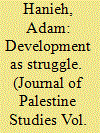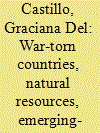| Srl | Item |
| 1 |
ID:
148620


|
|
|
|
|
| Summary/Abstract |
The occupied Palestinian territories (oPt) are a major recipient of global aid flows, ostensibly aimed at improving development outcomes for the Palestinian population. This article presents a critical analysis of the ways that development is being conceived and practiced by major actors in the oPt. By analyzing different conceptions of power, the article examines how dominant approaches to development hide the ongoing reality of Israeli settler colonialism by dehistoricizing Zionism and its project; incorporating the structures of Israeli occupation into official Palestinian development strategy; and promoting an economic perspective that views development as an objective and disinterested process operating above (and outside) power relations. After considering some of the ramifications of current approaches to development, the article concludes with brief remarks on how this critique can help to reframe and articulate an alternative strategy.
|
|
|
|
|
|
|
|
|
|
|
|
|
|
|
|
| 2 |
ID:
136059


|
|
|
|
|
| Summary/Abstract |
The unsustainable aid dependency of war-torn countries – most of which are rich in natural resources – makes it imperative to start gradually replacing aid with foreign direct investment (fdi) and exports. This article identifies ways in which stakeholders – governments, the international community, including the UN development system, foreign investors, and local communities – could work together in a ‘win-win’ situation. Most crucial is avoiding conflict-insensitive policies that fuel discord by putting governments and foreign companies, often from emerging markets, in direct confrontation with local communities. The control of natural resources is often a root cause of conflict, and the latter’s exploitation can become a major challenge as wars end. The peculiarities of war-torn countries are discussed along with the specific impediments to attracting fdi into the exploitation of natural resources. An effective and fair legal framework is necessary to ensure that investors do not operate as ‘enclaves’, creating new conflicts.
|
|
|
|
|
|
|
|
|
|
|
|
|
|
|
|